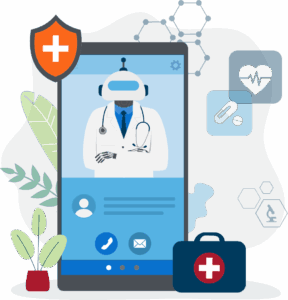AI and Your Practice: Key Insights on AI Usage Among Family Physicians and Primary Care Providers
Business

Aaron Glauser
May 29, 2025

A recent Rock Health survey revealed family physicians and primary care providers are ready to explore how AI-powered tools can address their biggest operational challenges.
AI-enabled tools and generative AI platforms have taken the whole world by storm, especially the world of healthcare. Earlier this year, a Medical Group Management Association (MGMA) survey found that more than 30% of medical group owners say AI tools are their “top tech priority” this year. More recently, a report from Healthcare Dive revealed that 95% of industry leaders from payor, provider and pharmaceutical organizations believe generative AI technology will be transformative during the next three to five years.
As a healthcare technology company focused on the ambulatory care space, AdvancedMD is especially interested in AI adoption and comfort levels among smaller, private practices. It’s one thing to pilot an AI implementation when you have the unlimited resources—and budget—of a large healthcare system. But it’s quite another to integrate AI-enabled tools into your healthcare technology stack as an independently owned medical group.
That’s why we found Rock Health’s recent survey of more than 1,200 family physicians and primary care providers so insightful. Conducted in partnership with the American Academy of Family Physicians (AAFP), the survey takes a deep dive into AI adoption and comfort levels within, specifically, family physician and primary care settings.
All the ways primary care doctors are using AI at work—and home
According to Rock Health’s findings, most of the healthcare providers surveyed are using digital solutions to run daily operations at their practices, including but not limited to EHRs and patient engagement platforms.
More specifically, half of the respondents reported using AI-enabled tools for, at least, one use case at work, and more than 90% say they have tried or are open to trying AI tools for a variety of work tasks and responsibilities, including but not limited to:
- Clerical support
- Information management
- Patient support
- Administrative functions
- Population health management
- Behavioral health support
When asked about current or regular usage of AI tools, 32% of the family physicians and primary care providers surveyed by Rock Health say that they use AI to draft messages and for ambient clinical documentation. More than half of the respondents who use it for clerical support report using it daily.
But these healthcare providers are not just using AI at work. Sixty-two percent of the survey respondents report using generative AI platforms, such as ChatGPT, for personal reasons, and 18% report using AI tools outside of work daily—a significantly higher adoption rate compared to the 6.4% of the general public who report using AI daily for personal use.
The top AI concerns among family physicians and primary care providers
The majority of survey respondents said that they believe AI technology will improve clinical efficiency, with 73% agreeing it will accelerate time to diagnosis and 66% reporting it will have a positive impact on their workload.
But some are still skeptical when it comes to AI’s impact on the patient experience: 47% said they don’t believe it will improve patient satisfaction within the next three years and more than 50% don’t expect it to enhance the personalization of care or to have an influence on clinician-patient relationships during the same timeframe.
The biggest AI concerns for healthcare providers, it seems from the survey findings, are less about its influence on care and more about the role it will play in the workplace. While less than 20% fear AI will have a negative impact on their job security, nearly 70% said they want medico-legal protections in place before they would trust AI tools and 68% want to be educated on the legal, liability, and malpractice risks associated with AI.
The importance of responsible AI usage for private practices
Nearly 70% of the family physicians and primary care providers who took part in the Rock Health survey said that they are looking for ethical guidelines on how best to use AI in their practice.
As a healthcare technology company that has been on the forefront of responsible AI usage, our engineers and software developers are intentional about how artificial intelligence is integrated into our unified EHR, practice management, and patient engagement solutions. According to our Head of User Design, Trent Peterson, one of the greatest things about emerging AI technology is that it has the potential to democratize access to effective software platforms for medical groups of all sizes, including small independent practices that lack the IT budgets of large hospital networks and private equity-owned medical groups.
Trent believes AI advancements will have a potential impact on private practices, with the possibility of giving providers the ability to analyze patient data with improved efficiency. Also, in an accelerated amount of time, it may give smaller practices the ability to scale their patient communication efforts and engagement so that patients are more involved in their healthcare experience. It could help practice managers gain insights into trends so that they can optimize daily operations and streamline workflows to fortify a practice’s financial health.
But before such advantages can be achieved, it is crucial that stakeholders consider a responsible approach to their AI usage. They should be diligent in their evaluations of AI tools, implementing solutions that are compliant and meet industry regulations.
AdvancedMD is focused on bringing AI to the ambulatory care space, ensuring private practices have access to AI tools that may help with productivity and streamline operational workflows. Our engineering and product teams are committed to making AI-enabled solutions accessible, practical, and impactful, while also adhering to responsible AI usage. You can learn more about our approach to AI at: Artificial Intelligence in Healthcare.
Get a Free, Personal & Live Demo
Get an in-depth overview of AdvancedMD and our Amazon Web Services cloud platform to learn how automated and unified software can make life better for every role of your practice (patients included).
Request live demo